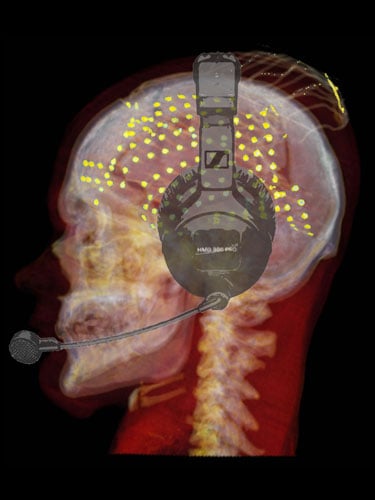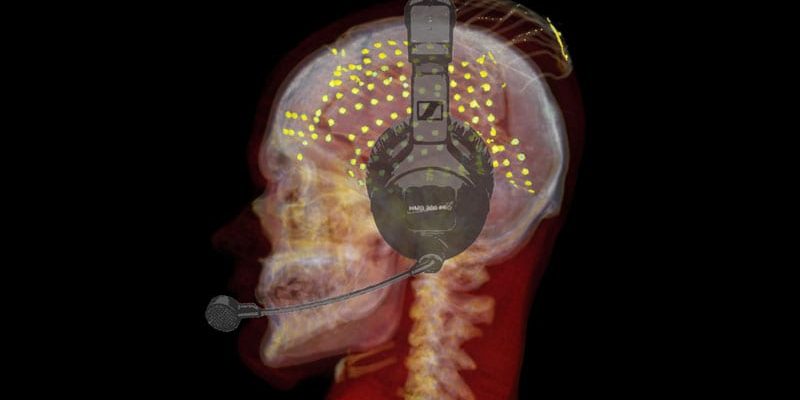Specific brain areas are critical in the detection and correction of vocalization errors in new findings that may have implications for the treatment of speech deficits in stroke and Parkinson’s disease (PD), among others.

Intracranial electrodes recording neural responses during speech production and delayed auditory feedback.
Using electrocorticographic recordings from neurosurgical patients, researchers found that the dorsal precentral gyrus (dPreCG) plays a critical role in processing auditory error signals during speech production to maintain fluency.
This novel finding has implications for treating vocalization problems in patients with post-stroke aphasia and PD and those who stutter, said study investigator Adeen Flinker, PhD, assistant professor of neurology, Grossman School of Medicine and NYU Langone Health, and assistant professor in school of biomedical engineering.
“This might be far-fetched, and there’s no evidence to support this, but perhaps if it’s shown this area is malformed in people who stutter, you could target physical or neuromodulatory approaches like brain stimulation,” Flinker told Medscape Medical News.

Dr Adeen Flinker
The findings were published online February 3 in PLOS Biology.
Neural Underpinnings
When people talk to each other, they continuously monitor their speech and adjust their vocalization to maintain fluency, said Flinker.
For example, speakers involuntarily raise their voice when background noise masks auditory feedback. They also compensate for delays in auditory feedback from things like echoes during teleconferencing by slowing down speech.
Abnormal auditory feedback control has been implicated in various disorders, including PD, autism spectrum disorder, aphasia, and stuttering. Interestingly, hearing an echo of their voice delays speech and makes it difficult for those without a speech deficit to speak continuously. But for individuals with a stutter, delaying their speech allows them to speak more fluently.
However, the neural underpinnings of this auditory feedback control system remain poorly understood.
“We wanted to focus on and understand the different cortical structures and cortical networks involved in our ability to monitor ourselves and automatically correct speech,” said Flinker.
For the study, researchers used electrocorticography (ECoG) to acquire direct cortical recordings from 15 patients with epilepsy (eight women; mean age, 34 years). All were implanted with electrodes in preparation for epilepsy surgery.
Simulating an Echo
Cortical neural signals during speech production were examined using a delayed-auditory feedback paradigm.
Artificially slowing speech when hearing one’s own delayed voice provides a strong framework to investigate how auditory feedback influences the motor control of speech, the researchers note.
As participants read aloud 10 different three-syllable words and six different eight-word sentences, researchers recorded their voice and played it back to them through earphones, either simultaneously (no delay) or with a delay of 50, 100, and 200 ms.
The short, long, and really long delays simulated an echo, Flinker said.
The patients slowed down their speech to compensate for delays. The maximal disruption of speech occurred at a 200 ms feedback delay for both word- and sentence-reading tasks.
An unsupervised clustering algorithm was used to determine auditory and motor regions of the brain involved in speech production. The investigators focused on subregions that control how individuals move their mouth, lips, and tongue to form words, which have a role in processing what they hear themselves saying.
“As speech becomes slowed down, we’re trying to mark which areas of the brain are encoding for error ― the mismatch between what you thought you were going to hear and what you actually heard,” said Flinker.
A New Perspective
Three subregions of the speech network that are centrally engaged in the detection and correction of vocalization errors were identified. These were the superior temporal gyrus, the supramarginal gyrus, and the dPreCG.
However, the upper region of the precentral gyrus appeared to play a more central role in encoding the auditory error. This is notable because this brain area is known for its role in controlling voluntary movements but has never before been implicated in auditory feedback control, the investigators note.
“What was surprising was that the motor cortex was processing an auditory error, and only half of it is doing so,” Flinker said.
In addition, the dorsal precentral gyrus only “kicked in” when speech became much more effortful, for example: when “it became unwieldly to speak an entire sentence with these delays,” he added.
The new study “changes our view of speech centers,” said Flinker. “It supports a growing body of evidence that there’s this motor cortex center that’s critical for speech,” which should affect the direction of future research.
The results could also be important for future therapy. Perhaps more targeted biofeedback or brain stimulation approaches could be developed to treat speech deficits such as those involved stuttering, Flinker noted.
The investigators plan to conduct further research into the brain’s feedback mechanisms for controlling speech.
The study was funded by grants from the NIH, the National Institute of Neurological Disorders and Stroke, the NSF, and the Leon Levy Foundation Fellowship. The investigators have reported no relevant financial relationships.
PLOS Biol. Published online February 3, 2022. Full article
For more Medscape Neurology news, join us on Facebook and Twitter.
Source: Read Full Article
